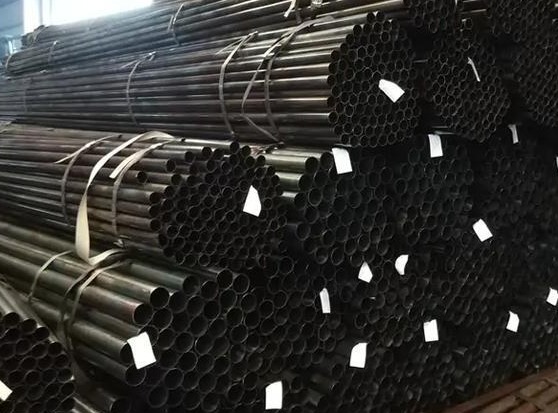1. Construction and Infrastructure
(1) Building Structure
Scaffolding: Temporary support structure, which needs to be light and have strong load-bearing capacity.
Building Frame: Steel frame structure of factory and warehouse, which needs to be rust-proofed.
Guardrails and Stairs: Stair handrails, balcony guardrails, etc.

(2) Water Supply and Drainage System
Tap water pipes: Commonly used in the early days, MS pipes are now mostly replaced by galvanized pipes or PVC because they are easy to rust.
Fire pipes: Sprinkler system main pipes.
Rainwater drainage: Building roof drain pipes and underground drainage channels, which need anti-corrosion coating.
2. Industrial Applications
(1) Oil and Gas
Low-pressure pipelines: MS pipes are suitable for short-distance transportation of non-corrosive media (such as crude oil and natural gas).
Structural support: used for derricks and platform support pipes, which need to be galvanized or painted for corrosion protection.
(2) Chemical and Pharmaceutical
Non-corrosive fluid transportation: such as air, inert gas, and low-temperature water. If the medium is highly corrosive, stainless steel pipes should be used instead.
Ventilation ducts: factory exhaust systems, low cost and easy to weld.
(3) Machinery and Manufacturing
Hydraulic systems: low-pressure hydraulic oil pipes, high-pressure requires seamless steel pipes.
Conveyor rollers: production line material conveying brackets.
3. Agriculture and Irrigation
Irrigation water pipes: farmland sprinkler systems, economical and practical, but require regular maintenance to prevent rust.
Greenhouse structures: greenhouse frames (galvanized MS pipes are more durable).
4. Public Utilities and Municipal Engineering
Power cable protection: underground cable casing (requires anti-corrosion treatment).
Light Poles: Support structures for street lighting (typically hot-dip galvanized).
Traffic Sign Poles: Supports for highway signs.
5. Automotive and Transportation
Chassis Components: Structural tubing for trucks and trailers, requiring high strength and weldability.
Exhaust Systems: Exhaust pipes for some low-end vehicles are susceptible to corrosion at high temperatures, while high-end vehicles use stainless steel.
Limitations of Using MS Pipe:
1. Corrosion Susceptibility: Galvanizing, painting, or regular maintenance are required, especially in humid chemical environments.
2. Inadequate Performance in High-Pressure/High-Temperature Environments: Alloy steel pipes should be used for temperatures exceeding 300°C or for high-pressure applications.
3. High Hygiene Requirements: Stainless steel or food-grade plastic pipes are recommended for drinking water systems.
Conclusion:
MS pipes are a popular choice in construction, industry, and agriculture due to their low cost, high strength, and ease of fabrication. However, their susceptibility to corrosion requires coating or regular maintenance. When selecting a pipe, consider the media properties, environmental conditions, and budget to weigh alternatives (e.g., galvanized vs. stainless steel).
Read more: MS Pipe and GI Pipe Difference or China Seamless Pipe Manufacturer & Exporter List

